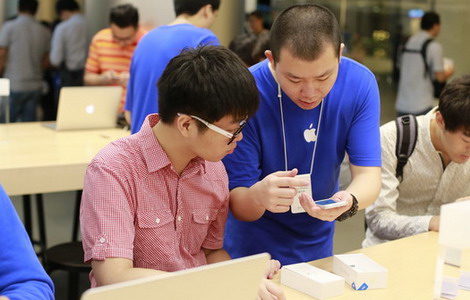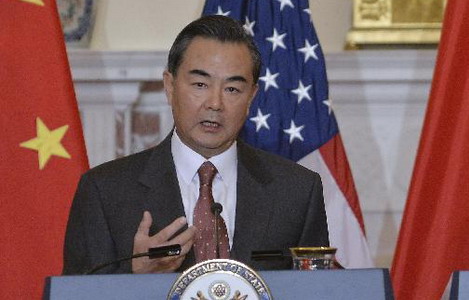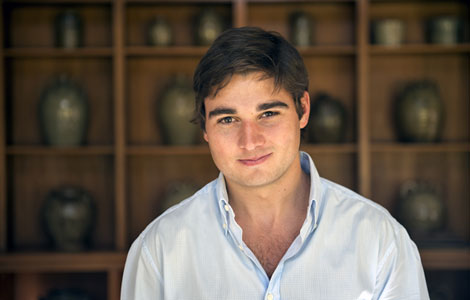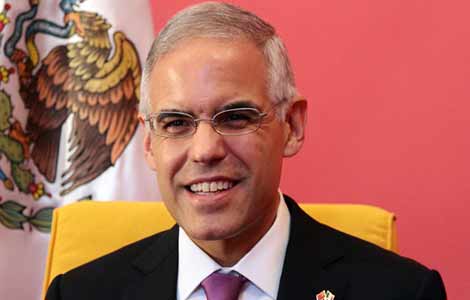Confucius Institutes more than language
Updated: 2013-09-19 14:59
By David Gosset (China Daily)
|
||||||||
Classrooms are a laboratory for cross-fertilization of linguistics and culture
The development of the Confucius Institutes should not be interpreted as a mere linguistic phenomenon; it reveals six of the main features defining the Chinese renaissance: economic reemergence, speed of change, socio-political transformation, civilizational revival, China's outward projection and the entry, through a cognitive shift, into what could be called an era of a new Sinology.
First, China's economic progress has not only created the conditions for the government to establish an international network promoting Mandarin, but also guarantees a high demand for the Chinese language. The attraction of a language is proportionate to the perceived power and prestige of its country of origin, and when the Chinese economy surpasses the US GDP, probably by 2020, interest in its language will reach new heights.
Second, if the Confucius Institute has risen amid broader geopolitical dynamics, the pace of its expansion also reflects the speed of change that characterizes our time. The first institute opened in the South Korean capital, Seoul, in 2004, and the global network now takes in more than 400 centers in 108 countries and regions. Seventy of the world's top 200 universities have opened a Confucius Institute, and more than 400 universities wait to join the system.

By 2020 the network will have 1,000 centers, and it will then be equivalent to the Alliance Francaise, which today is as large as the British Council, Goethe Institut and Cervantes Institute combined. Thus Beijing will achieve in less than two decades what Paris took 130 years to achieve.
Third, the existence of the Confucius Institute points to a striking socio-political transformation. Before Deng Xiaoping's reform and opening-up, relations between Chinese and foreigners were marked by fear and suspicion. In the Confucius Institutes worldwide - there are 70 in the US - the vast majority of the Chinese professors interact with their students and colleagues in a constructive spirit of openness and friendship.
Fourth, the organization's very name is a reminder that China's modernization is more about the reinterpretation of the Chinese tradition than a passive Westernization, the evocation of Confucius (551BC-479BC) standing as an obvious reference to the classical foundations of Chinese civilization.
China's renewal - at once advancing and returning - is expressed in the name of an institution created 25 centuries after the death of the country's greatest educator - the first character of the Analects is xue, meaning study.
Fifth, the Confucius Institute network is at the forefront of China's global projection, one of the most striking aspects of the Chinese renaissance. Through the institutes, the world becomes obviously more familiar with the Chinese language and the Chinese people but they are also vectors for the outward journey of Chinese culinary practices, tea customs, traditional Chinese medicine, calligraphy and other elements of Chinese culture.
The internationalization of the Chinese education system has been hitherto associated with the presence of foreign academic institutions in China - New York University Shanghai has just officially opened - but one should be ready for a new stage, the global projection of Chinese schools. China Europe International Business School first opened in Shanghai in 1994, and enlarged its scope with a campus in Beijing in 2010 after having started to deliver programs in the Republic of Ghana the previous year.
Zhejiang University will open facilities in Britain, and Xiamen University has plumped to do so in Malaysia, and while their growth does not match that of the Confucius Institute, it will change the face of global education.
Chinese institutions of higher education have taken Western academic structures as their models for a century - the Imperial University of Peking, China's first university and the immediate predecessor of Beijing University was established in 1898 - but the relations have now become now more balanced. The Academic Ranking of World Universities, a highly visible publication of Shanghai Jiaotong University, was originally a benchmarking exercise for Chinese universities, and over a decade it has evolved into a reference point for universities worldwide.
The Confucius Institutes also introduce a significant shift in thinking: China can no longer be regarded as an external other, but is a living example of global modernity.
Whatever the location of the traditional Chinatown, it has remained, in the collective psyche, a peripheral enclave on the margins of the community. The Confucius Institute, on the other hand, not only fully integrates the local environment but cooperates with the most prestigious foreign academic institutions.
Last year the Confucius headquarters, known as the Hanban, took another timely and revealing initiative, the New Sinology Plan, which provides funding for international graduate students to conduct research in the humanities. This Chinese financial support of young foreign Sinologists for studies at top Chinese universities is a hallmark of the new era of Sinology, whose first chapters were written by Benjamin Schwartz, Pierre Ryckmans and Geremie Barme.
Liberated from the postulates of orientalism, the new Sinology is more apt to capture the dynamics of a country that has fully re-entered history. China is not only on the map but has gained a new centrality in the world.
China's renaissance widens its people's horizon but also enlarges a planet that has been, to a certain extent, contracting for more than 500 years. It is in this context that each classroom of the Confucius Institute can be seen as a laboratory in which an unprecedented cross-fertilization between China and the world is taking place.
David Gosset is director of the Academia Sinica Europaea at China Europe International Business School, Shanghai, Beijing and Accra, and founder of the Euro-China Forum. The views do not necessarily reflect those of China Daily.
(China Daily USA 09/19/2013 page12)

 iPhone 5s, iPhone 5c hit Chinese market
iPhone 5s, iPhone 5c hit Chinese market
 China to play 'constructive' role on Syria: FM
China to play 'constructive' role on Syria: FM
 iPhone 5s, iPhone 5c hit Chinese market
iPhone 5s, iPhone 5c hit Chinese market
 Faces of Tibet
Faces of Tibet
 Full moon across China
Full moon across China
 Wearable technology, the new game-changer
Wearable technology, the new game-changer
 Tapestry of Chinese culture and a Harvard teen's feeling
Tapestry of Chinese culture and a Harvard teen's feeling
 A simple but pure festival tradition
A simple but pure festival tradition
Most Viewed
Editor's Picks

|

|

|

|

|

|
Today's Top News
UN lauds China on food waste efforts
Chinese firms face trust deficit
13 injured in Chicago park shooting
Wang and Kerry meet in DC
Belgian zoo owner set to host Chinese pandas
Trending news across China
Fast-track process sees more NGOs
Beijing sends out positive smoke signals
US Weekly

|

|





